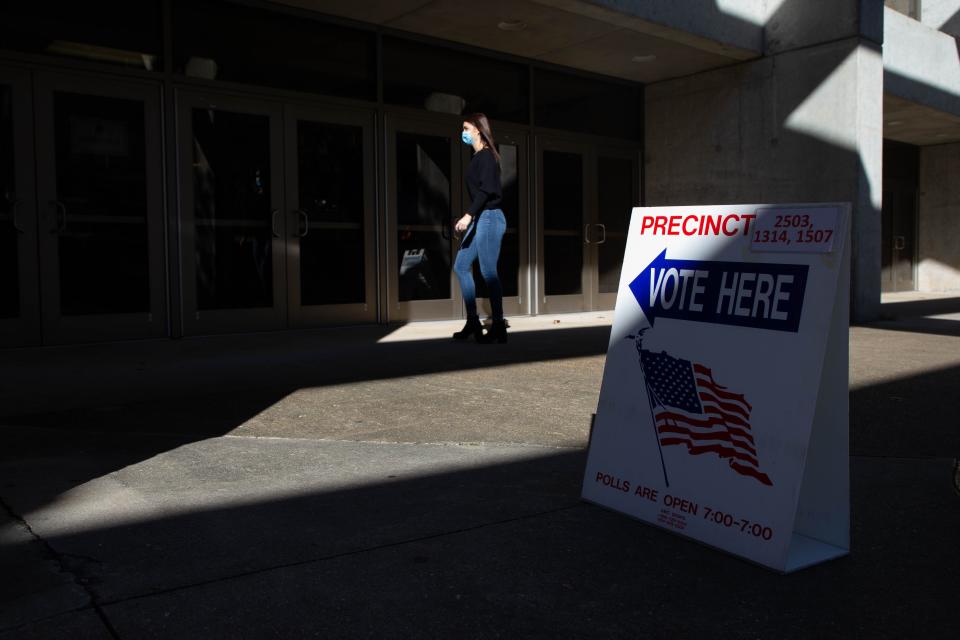Latest lawsuit to challenge new Florida election law calls it racist, asks for federal oversight

Florida’s controversial new election law is discriminatory against Black people/ and other marginalized communities and will prevent them and seniors, people with disabilities, and low-income residents from voting, according to a new lawsuit filed in federal court in Tallahassee.
The suit is the latest of several filed against Secretary of State Laurel Lee and as a class action against all 67 county election supervisors to challenge the constitutionality of the law, which took effect immediately upon Gov. Ron DeSantis’s signature on May 6.
Lawsuits: Lawsuits swamp Florida’s new elections law signed by Gov. DeSantis
Election laws: While Georgia saw a corporate backlash, response is muted in Florida
Like the others, the suit asks the court to block implementation of the law, claiming it “creates major obstacles to vote-by-mail, curtails access to drop boxes, and criminalizes line warming activities such as providing water to voters.”
“It is an anti-Democracy bill that makes it harder to vote by mail, criminalizes line warming activities… violates free speech rights...denies reasonable accommodation for people with disabilities," said Judith Browne Dianis, executive director of Advancement Project National Office, during a Zoom news conference Tuesday.
Lawsuit 'explicitly alleges race discrimination'
The suit was filed by Advancement Project National Office, Demos, and LatinoJustice PRLDEF on behalf of Florida Rising, Faith in Florida, Equal Ground Education Fund, UnidosUS, the Hispanic Federation and Poder Latinx.
Dianis said she was proud to stand with her partners "to thwart the implementation of this racist, antidemocratic and unjust law. We cannot stand idly by when State leans into Jim Crow 2.0."
Unlike the other lawsuits, "ours is the only one that explicitly alleges race discrimination," said Jorge Vasquez, the power and democracy director for the Advancement Project National Office.
DeSantis and other Republican leaders have defended the law against criticism from Democrats, voting groups and election supervisors across party lines as further protection of the state's election system.
“Florida took action this legislative session to increase transparency and strengthen the security of our elections,” DeSantis said during the bill signing. “Floridians can rest assured that our state will remain a leader in ballot integrity. Elections should be free and fair, and these changes will ensure this continues to be the case in the Sunshine State.
Christina Pushaw, DeSantis's press secretary, said the lawsuit "grossly misrepresents the actual legislation that the Governor signed to safeguard election integrity."
The lawsuit claims the new law violates the Voting Rights Act and is part of a long history of discriminatory voting requirements in Florida going back 100 years. It cites the 2011 bills that targeted early voting and third-party registration and a 2019 law that required returning felons seeking to restore their voting rights to first pay all their fines and fees.
The new law "unlawfully abridges voters’ rights to voter assistance at polling locations," undermines the work of third party voter advocacy groups, and disproportionately affects Black and Hispanic communities, the lawsuit claims.
Law a response to mobilizing Black, Latino voters, one attorney says
The law was passed amid a backdrop of unprecedented voter turnout and the use of mail-in ballots, despite the pandemic, and seems to specifically target mechanisms that increased voter registration and turnout among Black and Latino voters, said Stuart Naifeh, senior counsel for DEMOS.
The law "can only be seen as a response to the mobilization of Black and Latino voters," Naifeh said, adding that the state should be forced to submit to a Department of Justice review to prove the new law won't restrict voter access.
A record 1.38 million Black voters and 1.8 million Latino voters participated in the 2020 general election in Florida, the lawsuit said.
"The diverse components of SB 90 are linked because they target these voting practices, including unprecedented use of mail ballots, unprecedented use of secure drop boxes, and significant organized efforts to support voters who encounter long lines or other obstacles to in-person voting," the suit claims.
In particular, they objected to a requirement by third party groups to issue a disclaimer that voter registrations might not get processed in time to be valid. The lawsuit said that requirement violates the free speech rights of those organizations.
The law is a similar but watered down version of laws passed in other battleground red states. It adds new identification requirements to obtain vote–by-mail ballots, prohibits the mass mailing of ballots, bans “ballot harvesting" or collecting large numbers of ballots on behalf of voters, drastically cuts back the hours ballot boxes can operate and bans private grants and contributions to help county election supervisors run elections.
It does not specifically ban people from offering food and water to voters waiting in long lines at the polls, as other states have done. However, it imposes criminal penalties and fines for anyone “engaging in any activity with the intent to influence or effect of influencing a voter,” which effectively bars handing out food and water, the suit claims.
The line warming ban affects Black and Latino communities disproportionately, said Mone Holder, senior director of advocacy and programs at Florida Rising.
Also, Naifeh said, the Legislature offered no valid reason or legitimate state interest for the new requirements and restrictions. On the contrary, the governor and Republican lawmakers who pushed these new restrictions praised the secretary of state and local election supervisors for a near-perfect administration of the 2020 election that had no evidence of fraud.
"We are simply asking the court to stop the state from implementing practices … that are completely unjustified by any need," Naifeh said.
Jeffrey Schweers is a capital bureau reporter for USA TODAY NETWORK-Florida. Contact Schweers at jschweers@gannett.com and follow him on Twitter @jeffschweers.
This article originally appeared on Tallahassee Democrat: New Florida voting law racist, unconstitutional, lawsuit claims

 money
money 